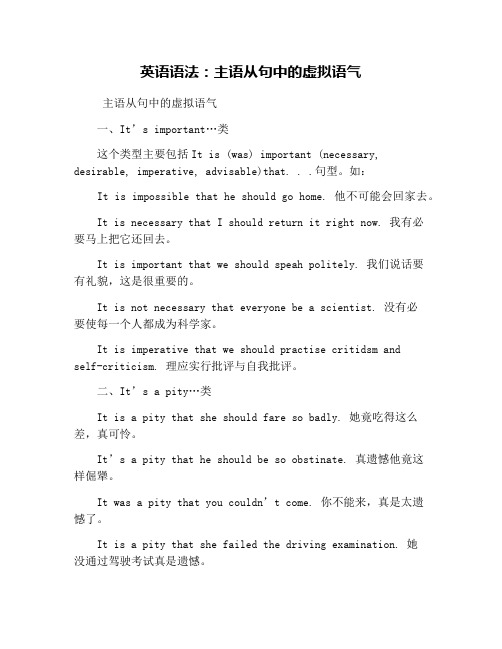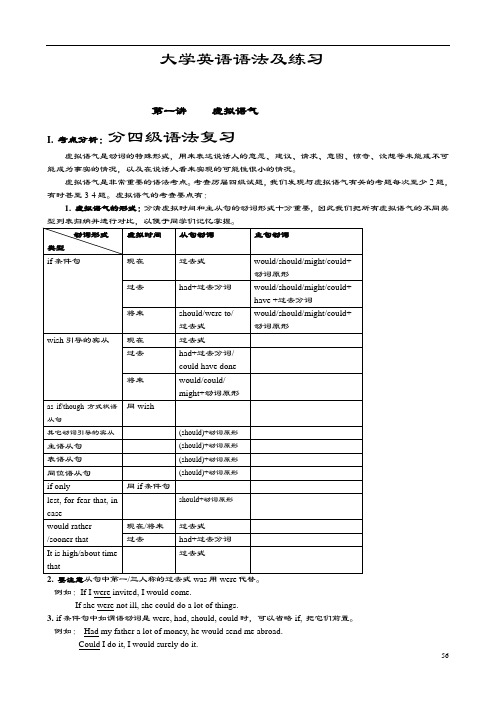大学英语语法 虚拟语气
- 格式:doc
- 大小:45.50 KB
- 文档页数:9

精品语法结构:虚拟语气虚拟语气是一种用来表达假设、愿望、建议、命令、推测等含义的语法结构。
在英语中,虚拟语气通常通过使用特定的动词形式来表示。
下面是一些常见的虚拟语气语法结构:1. 虚拟条件句:- If I were you, I would do it differently.(若我是你,我会做得不同。
)- If I had studied harder, I could have passed the exam.(若我学得更刻苦,我本可以通过考试。
)2. 虚拟情态动词:- I wish I could speak fluent French.(但事实上我不会。
)- If only I had known about the sale earlier, I would have bought more.(但事实上我并不知情。
)- It is essential that she be here on time.(但事实上她可能不会来。
)3. 虚拟动词不定式:- I want you to be more careful.(表示建议)- He asked that I take the book back.(表示请求或命令)4. 虚拟动词过去式:- I suggested that they go to the beach.(表示建议)- It is about time that she left.(表示必要性)5. 虚拟名词从句:- I have no idea what he would do if he were in my shoes.(表示假设)- I doubt that she knows the answer.(表示怀疑)6. 超过虚拟语气:- He talks as if he were the boss.(他说话的口气好像他是老板。
)- She acts as though she had won the lottery.(她的行为好像她中了彩票一样。

英语语法:主语从句中的虚拟语气主语从句中的虚拟语气一、It’s important…类这个类型主要包括It is (was) important (necessary, desirable, imperative, advisable)that. . .句型。
如:It is impossible that he should go home. 他不可能会回家去。
It is necessary that I should return it right now. 我有必要马上把它还回去。
It is important that we should speah politely. 我们说话要有礼貌,这是很重要的。
It is not necessary that everyone be a scientist. 没有必要使每一个人都成为科学家。
It is imperative that we should practise critidsm andself-criticism. 理应实行批评与自我批评。
二、It’s a pity…类It is a pity that she should fare so badly. 她竟吃得这么差,真可怜。
It’s a pity that he should be so obstinate. 真遗憾他竟这样倔犟。
It was a pity that you couldn’t come. 你不能来,真是太遗憾了。
It is a pity that she failed the driving examination. 她没通过驾驶考试真是遗憾。
It is his desire that a medical man should stay here. 他希望有一个医务人员留在这里。
三、It’s desired…类这种主语从句还常用在It is (was) desired (suggested, settled, proposed, requested, decided, etc. ) that...句型。


大学英语语法及练习第一讲虚拟语气I. 考点分析:分四级语法复习虚拟语气是动词的特殊形式,用来表达说话人的意愿、建议、请求、意图、惊奇、设想等未能或不可能成为事实的情况,以及在说话人看来实现的可能性很小的情况。
虚拟语气是非常重要的语法考点。
考查历届四级试题,我们发现与虚拟语气有关的考题每次至少2题,有时甚至3-4题。
虚拟语气的考查要点有:1. 虚拟语气的形式:分清虚拟时间和主从句的动词形式十分重要,因此我们把所有虚拟语气的不同类型列表归纳并进行对比,以便于同学们记忆掌握。
2. 要注意从句中第一/三人称的过去式was用were代替。
例如:If I were invited, I would come.If she were not ill, she could do a lot of things.3. if条件句中如谓语动词是were, had, should, could时,可以省略if, 把它们前置。
例如:Had my father a lot of money, he would send me abroad.Could I do it, I would surely do it.Should the Black Death reappear, what should we do?(万一黑死病再次出现,我们该怎么办?)4. 错综时间的条件句是难点,如99年1月第60题: If I hadn’t stood under the ladder to catch you when you fell, you wouldn’t be smiling now.(从句用过去完成时,主句用现在进行时)又如:If I were you, I would have gone to the film last night.(从句虚拟现在,主句虚拟过去);If we hadn’t got everything ready by now, we should be having a terrible time tomorrow.(从句虚拟过去,主句虚拟将来);If the weather had been more favorable, the crops would be growing still better.(从句虚拟过去,主句虚拟现在) 5. 虚拟句的另一难点是省略if条件句的含蓄条件句,如:I would have written the paper before, but I have been ill.(=If I had not been ill, I would have written the paper before.);A true friend would have acted differently. (=A friend, if he had been true, would have acted differently.)6. 注意介词短语without, but for, in the absence等表示虚拟条件。

英语语法虚拟语气的知识点归纳英语语法:虚拟语气的知识点归纳虚拟语气是英语语法中的一个重要部分,它用于表达一种假设、愿望、建议、要求或可能性较小的情况。
在本文中,将对虚拟语气的几个主要知识点进行归纳总结。
1. 条件句中的虚拟语气在条件句中,虚拟语气通常用于表示与当前事实相反的情况。
虚拟语气的形式包括"would/could/should+动词原形",以及"动词过去式+动词原形"。
例如:- If I had more time, I would travel around the world.(如果我有更多时间,我就会周游世界。
)- If I were you, I would study harder.(如果我是你,我会更加努力学习。
)2. 虚拟语气用于表达愿望和建议虚拟语气还常用于表达愿望和建议,表示一种假设的情况。
常见的表达方式有:- I wish/If only + 主语 + 过去式(be动词用were):表示对现在或将来的希望或遗憾。
例如:- I wish I were taller.(我希望自己更高。
)- If only she could speak fluent English.(要是她能说一口流利的英语就好了。
)- It is time + 主语 + 过去式(should + 动词原形):用于表示现在或将来应该发生的动作。
例如:- It is time we started the meeting.(是时候开始会议了。
)- It is time you should apologize to her.(你应该向她道歉了。
)3. 虚拟语气在宾语从句中的使用在宾语从句中,若主句的动词表达了建议、命令、要求等含义时,宾语从句中的谓语动词常使用虚拟语气。
具体的用法如下:- 建议:suggest/recommend + (that) + 主语 + (should)+ 动词原形。

英语语法解析虚拟语气If this were not the case, and every teacher had to be taught what he in turn teaches others, there would be no beginning in the acquisition of knowledge. Hence, there must be discovery--the process of learning something by research, by investigation, or by reflection, without being taught.【翻译】如果情况不是这样的,而且如果每个老师都不得不接受别人的教育,然后再接着教别人,在知识的习得方面就永远没有开始了。
所以必须得有发现才行——就是通过研究,调查,或者反思,不需要他人教,就学会了某样东西的过程。
【语法分析】第一句是一个主从复合句。
句首有两个if引导的条件状语从句。
只是and后面的第二个If被省略了。
也就是有两个假设的情况。
句首的代词this指的是昨天学的最后一句话里的gain knowledge without being taught这件事,属于前指现象。
主句是there would be no beginning...注意这个句子的动词使用的是虚拟语气,即在句子If this were not the case里,动词是were,不是was, 更不是is, 表示与现在的事实相反的假设。
在与现在事实相反的虚拟语气里,条件句里的系动词is和are都需要变成were,其他动词也都要变成过去式。
而在every teacher had to teach...里,had 也一样用过去式。
在主句里动词用的是过去将来时 there would be no beginning...在第二个条件状语从句中,what he in turn teaches others是一个宾语从句,作teach的宾语,in turn是一个插入语,作状语,“依次地”。
虚拟语气一、语气的分类语气概述:语气,跟失态和语态一样,也是动词的一种形式,表明说话者的意图、态度和目的。
英语中有三种语气:陈述语气、祈使语气和虚拟语气。
1.陈述语气:用来陈述事实或提出想法,包括肯定、否定例:Recent pressure at work may account for his behaviour.他的行为也许是最近的工作压力导致的。
2.祈使语气:表明说话人提出请求、命令或劝告等例:Calm down and tell me what happened.冷静点儿,告诉我发生了什么事。
祈使语气也可用在并列句中表示条件Work hard and you will succeed.好好干,你会成功的。
H e quick or you’ll be late.快点儿,否则你会迟到。
3.虚拟语气:表示说话人的一种愿望、建议、请求、命令;有时是一种非真实的假设,与事实不符或相反的情况例:If had seen him yesterday, I would have told him the news.我如果昨天见到他,就会把这个消息告诉他了。
二、虚拟语气的用法(一)虚拟语气在条件句中的应用1.虚拟语气主要用在虚拟条件中,表示根本不存在的情况或可能很小的假设虚拟语气用于if条件句中时,主句和从句谓语动词的形式如下:——与现在事实相反:过去式(be一般用were)should/ would/could/might+动词原形——与过去事实相反:had+过去分词should/ would/ could/ might have +过去分词——与将来事实相反:过去式(be一般用were)/should + 动词原形/ were to + 动词原形should/ would/ could/might + 动词原形例:If I had enough money, I would buy myself a computer.我如果有足够的钱,会为自己买一台电脑。
英语虚拟语气(最新版)目录1.虚拟语气的定义与作用2.虚拟语气的种类3.虚拟语气的用法4.虚拟语气的实例分析正文一、虚拟语气的定义与作用英语虚拟语气,又称虚拟条件句,是一种表示与事实相反、假设、建议或愿望的语气。
虚拟语气在英语中占有重要地位,因为它可以用来表示说话者对某种情况的看法或态度,或者表示一种假设、建议或愿望。
二、虚拟语气的种类1.表示与事实相反的虚拟语气:这种语气表示与现在事实相反的情况。
例如:“If I were you, I would study harder.”(如果我是你,我会更加努力学习。
)2.表示假设的虚拟语气:这种语气表示一种假设的情况。
例如:“If it rains tomorrow, we will stay at home.”(如果明天下雨,我们会呆在家里。
)3.表示建议的虚拟语气:这种语气表示对某人的建议。
例如:“If I were you, I would take the job.”(如果我是你,我会接受那份工作。
)4.表示愿望的虚拟语气:这种语气表示说话者的愿望。
例如:“If I could fly, I would travel around the world.”(如果我能飞,我会环游世界。
)三、虚拟语气的用法虚拟语气的用法主要取决于句子的时态、主语和从句的语境。
在虚拟语气中,动词的形式取决于表示的语气,一般有以下几种形式:1.表示与事实相反的虚拟语气:be 动词用 were;其他动词用过去式(be 动词用 were)。
2.表示假设、建议或愿望的虚拟语气:be 动词用情态动词 + 动词原形的形式;其他动词用情态动词 + 过去分词的形式。
四、虚拟语气的实例分析1.表示与事实相反的虚拟语气:例如:“If I were rich, I would buy a luxury car.”(如果我是个富人,我会买一辆豪华车。
)2.表示假设的虚拟语气:例如:“If he had time, he would go to the party.”(如果他有时间,他会参加派对。
虚拟语气虚拟语气用来表示假想,而不表示客观存在的事实,所说的是一个条件,不一定是事实,或与事实相反。
虚拟语气通过谓语动词的特殊形式来表示。
英语中的语气分为陈述语气、祈使语气、虚拟语气三类。
虚拟语气表示说话者所说的话并非事实,或难以实现的,甚至表达相反的概念。
另外表示主观愿望或表达某种强烈的感情时,也用虚拟语气。
条件状语1、表示与事实相反的情况从句:If+主语+过去时(Be动词用were)主句:主语+ should/would/might/could+do:If I were you,I would take an umbrella.如果我是你,我会带把伞。
(事实:我不可能是你)2、表示与过去事实相反的情况从句:If+主语+had+done主句:主语+should/would/might/could+have doneIf I had got there earlier, I should/would have met her. 如果我早到那儿,我就会见到她。
(事实:去晚了)3、表示对将来情况的主观推测从句:①if+主语+were to do (if 表示未来的虚拟语气独有形式,其他如wish, even if 等词都没有该形式来表示未来的虚拟语气)②if+主语+should+do③if+主语+过去式(be动词用were)主句:主语+should/would/might/could+doIf he should come here tomorrow, I would talk to him.如果他明天来这儿的话,我就跟他谈谈。
(事实:来的可能性很小,不可能)If there were a heavy snow next Sunday, we would go skating.如果下周日下大雪,我们就去滑冰。
(事实:下雪可能性很小,不可能)4、有时,虚拟条件句中,结果主句和条件从句的谓语动作若不是同时发生时,虚拟语气的形式应作相应的调整。
英语《虚拟语气》语法知识总结归纳虚拟语气(Subjunctive mood)是英语中一种特殊的语气形式,用于表示说话人的假设、愿望、建议、要求、命令等非真实情况。
虚拟语气在句子中通常与动词的调整和语法结构上的变化相关。
以下是对虚拟语气的语法知识的总结归纳:1.条件句中的虚拟语气:1.1 条件句中表示对现在的假设:使用虚拟语气的一般公式是:if + 主语 + 过去式,主句使用would/could/should/might + 动词原形。
例如:- If I were you, I would go to the meeting.(如果我是你,我会去开会。
)注意,这里的"were"是一个特殊的虚拟语气形式,用于所有人称和数。
- If she had studied harder, she might have passed the exam.(如果她努力学习,她可能会通过考试。
)1.2 条件句中表示对过去的假设:使用虚拟语气的一般公式是:if + 主语 + 过去完成时,主句使用would/could/should/might + have + 过去分词。
例如:- If I had known it, I would have told you.(如果我知道了,我会告诉你的。
)- If she had arrived earlier, she might have caught the bus.(如果她早点到,她可能会赶上公共汽车。
)2.虚拟条件句中的特殊情况:2.1 在虚拟条件句中表示命令、建议时,主句中的动词可以使用动词原形(而不是would/could/should/might + 动词原形)。
例如:- If you have any questions, please let me know.(如果你有任何问题,请告诉我。
)- If I were you, I would take a break.(如果我是你,我会休息一下。
虚拟语气 1. I wish (that可省略,下同)I knew the answer to the question.我希望知道这个答案。(事实上是不知道) 2. He wishes he hadn't lost the chance. 他真希望没有失去机会。(其实已失去) 3. You wished she would arrive the next day.(would + arrive) 你希望她第二天会到。(事实上她还没到)
Subjunctive Mood作为专门表达假设意义和其他非事实意义的动词形式,仅是古英语遗留下来的残余。它仅有两个形式,即be型虚拟式和were型虚拟式。 Be型虚拟]----- be型虚拟式是以动词原形表示的,不管主语是什么人称,动词一律用原形,如动词为被动态,则助动词be也用原形。其主要用法如下: 1)用于表命令、决定、建议、坚持等词语之后的that分句中 这一用法又分三种情况: a)用在 decide,decree,demand,insist,move,order,prefer,propose,recommend,request,require,suggest,vote等动词之后的that分句中.(宾语从句) 在expect, believe, think, suspect等动词的否定或疑问形式后的宾语从句中,我们经常用“should+动词原形(或完成形式)”,表示惊奇,怀疑,不满等。 He ordered that all the books be sent at once. He ordered that all the books be sent at once. we propose that somebody neutral take the chair. She insisted that she go to the south for her holiday. b)用在 advisable,appropriate,desirable,essential,fitting,imperative,important,impossible,necessary,obligatory,proper等形容词之后的that分句中。(主语从句) It is essential that all the facts be examined first. It was appropriate that thisi tax be abolished. I thousht it advisable that an armed guard stand in readiness. c)用在 decision,decree,demand,instruction,order,requirement,resolution等名词之后的that分句中。 The board has given instructions that the agent fly to Boston. We were faced with the demand that this tax be abolished. Their decision was that the school remain closed. 在这一用法中be型虚拟式能与“should+不定式”交替使用,也能与to-不定式交替使用。 He ordered that the books be sent at once . = He ordered that the books should be sent at onc. = He ordered that the books to be sent at once. 2)用于由if,though等引导的分句中. be型虚拟式能用于由if,though,whatever,lest,so long as lest, for fear that, in case so that, in order that 等引导的分句中表推测、让步、防备等含义。 If he be found guilty,Jonh shall have the right of appeal. Though everyone desert you, I will not. Quitly we sat on the river bank lest the fish swim away. 上述用法现在只限于书面体,在非正式语体中通常用动词陈述式或者用should/may+不定式。 Whatever hisdefense maybe,we can’t tolerate this disloyalty. 3)用于某些公式化语句中 be型虚拟式用于某些公式化语句中可表祝愿、诅咒、禁止等意义。 Long live the People's Republic of China! God bless you! God damn you! So be it.(但愿如此吧) Were型虚拟]----- Were 型虚拟语气只有一种形式,即无论主语是什么人称,动词一律用were,如 I were,you were ,如果动词为进行体或被动态,其助动词也一律用were,如I were going,you were going,I were sent ,you were sent 1)用于某些状语从句 如if , if only, as if , as though, though引导的条件状语和让步状语从句,表示非真是的条件或让步。 If I were you, I should wait till next week. If only I were not so nervous. He behaves as though he were better than us. 2)用于某些名词性从句 如wish, would rather, suppose,imagine 之后的that—分句中,表示一种臆想的(通常是不可能发生的事) I wish it were spring all the year round. I’d rather I were not at the site of the accident. Suppose the earth were flat. 上述were型虚拟式在第一三人称单数主语之后可为was 所取代。 If it was to rain,the game would be put off. If only I was not so nervous. 但是,在if I were you 这一分句中,通常不用was 。另外在某些倒装句结构中只用were,不用was。 Were I to do it =(if I were to do it),I should rely on you. 还有在as it were(作so to speak 解,即“宛如” ”好比”)结构中也只用were,不用was He is my best friend,my second felf ,as it were .
假设意义表示法综述 1) 用动词的过去时形式表示假设意义
a) It is (high ,about )time that It is time that we went (或should go) to bed. It’s about time that we put an end to this controversy. b) I would rather / would sooner / would as soon / would just as soon (that) you / he / they I’d sooner she left the heavy end of the work to someone else.
c) if only If only I knew what you wanted. If only he had arrived in time,he would not have been punished. d) as if, as though It seems as if it were spring. 现在好像是春天似的。 She appeared as if she had known nothing about it. 她看上去对此一无所知。 as if, as though 结构中如果不表示假设意义,就不必用过去时时态。 It looks as if it is going to rain. e) I wish(that) I wish I remembered the address. I wish 与I hope 都表示“希望”但I hope 并不表示假设意义其后很少用过去时时态。 I hope you are ready.
用情态助动词过去时时态表示假设意义 最常见于条件句和含蓄条件句 a) 用于条件句 (若if 省略要用到装) If she were younger, she would do it. 去If:Were she younger, she would do it. (把动词were移到主语she的前面) If he had tried it, he could have done it. 去If:Had he tried it, he could have done it.(把had移到主语he的前面) Were I a bird, I could fly freely. 如果虚拟条件句中有were, had或should时,把它们放在if的位置上;但是如果条件句中没有were, had或should不能用倒装。如: Should it rain tomorrow, what should we do? 要是明天下雨的话,我们怎么办呢? Were I you, I would have asked him for some advice.要是我是你的话,我就向他请教了。 在“开放式条件句”(open conditional clause)和让步状语从句中若should是被省略了的。在这种情况下,如果if省略,动词be与主语的位置要倒装。如: If any person be guilty of a crime, the court shall have the right to appeal. (任何人犯罪,法院有权起诉。) Be any person guilty of a crime, the court shall have the right to appeal. Whether she be right or wrong, she will have my unanswering support. (不管她对与错,我都会支持她) Be she right or wrong, she will have my unanswering support. 注意:有时虚拟条件句并没来if 从句表示出来,而是用介词短语(otherwise, or, without, but for)、上下文或其它方式来表示。 We didn't know his telephone number; otherwise we would have telephoned him. Without you help, I wouldn’t have achieved so much. But for your help, I would not have succeeded. 有时虚拟条件句的从句或主句都可以省略其中一个: